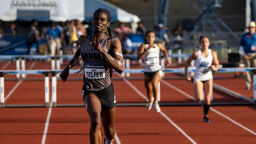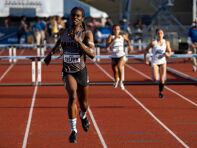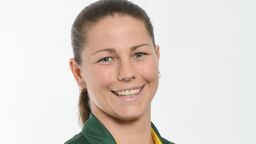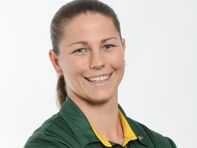From across the pond comes the latest headline in the transgender inclusion debate, this time from the BBC: “Dame Kelly Holmes, Paula Radcliffe and Sharron Davies to write to IOC over transgender athletes.”
Holmes, the two-time Olympic champion runner, Radcliffe, the world record holder and six-time world champion track star and marathoner, and Davies, Olympic silver medalist swimmer, have teamed up to question the International Olympic Committee’s long-standing policy of transgender inclusion.
Although Radcliffe has questioned whether it is “fair for a biological man to compete alongside women,” she has stood apart from Holmes and Davies in declaring: “Right now, transgender women are not a threat to female sport.” Radcliffe does believe, however, as lesbian tennis legend Martina Navratilova has claimed, there is a danger in a cisgender man potentially transitioning just to “manipulate this if there is an opening there to make money and win medals.”
The IOC has had a policy in support of transgender inclusion since 2004, and since then, not one trans athlete has qualified for a spot that might otherwise have been won by a cisgender competitor, let alone won a medal. And in those 15 years, there’s no record of any man faking being trans or transitioning solely for the purpose of beating cisgender women.
Want to send the IOC your recommendation for transgender inclusion? Scroll down for details on how.
Of course, as Outsports reported on March 13, the IOC is already actively recruiting researchers into this hot topic. And the BBC echoed our report in noting the IOC is “expected to publish updated guidelines after a lengthy consultation with various stakeholders. They include the IOC medical and scientific commission, medical, scientific, human rights and legal experts, plus international federations and national governing bodies.”
The current level of testosterone allowed for athletes by the IOC is below 10 nanomoles per liter, but there are reports it may be halved to under 5 nmol/L, matching a level proposed by the IAAF. Despite widespread reports that this is already decided, that is not the case. The reason the level is significant is because, as Science magazine reported in July 2018, “more than 99% of [cisgender] women have testosterone levels less than 3 nanomoles per liter.” There are, of course, women who have naturally higher testosterone levels, including South African 800m champion Caster Semenya. She is not transgender and is appealing proposed restrictions to her competing without medical intervention.
Canadian world champion cyclist and transgender advocate Dr. Rachel McKinnon argues against any testosterone level restriction, noting that this is applied only to competitors who identify as women, and that “this approach already treats trans women as ‘really’ men/male, who may only become women after sufficient medical intervention.”
McKinnon also makes the point that there is “relatively little empirical data on the relationship between endogenous testosterone and athletic performance,” referring to the T-levels naturally produced by all human beings, cisgender male, cisgender female, intersex, transgender male, transgender female and gender non-conforming, to various degrees. That is essentially the same point Holmes, Radcliffe and Davies are making as well, but they and McKinnon come at this question from opposite corners.
Davies tweeted about their effort on Sunday, recruiting other elite athletes to add their names.
Hi @sharrond62 @paulajradcliffe @damekellyholmes are sending a private letter 2 the @iocmedia asking 4 more research into residual benefits of transition in transgender sport. We ALL need a safe & fair place 2 compete, love more elite athletes: loads so far DM us 2add your name
— Sharron Davies MBE (@sharrond62) March 17, 2019
Davies tweets regularly about her position that transgender women athletes are male, and did so again Tuesday.
This explains things really well medically & ethically from a highly qualified source. Males cannot races females fairly. PODCAST: Why sex-segregated sport matters https://t.co/eTFnXjzAuw via @FeministCurrent
— Sharron Davies MBE (@sharrond62) March 19, 2019
The podcast she shared included discussion of McKinnon and her arguments in support of trans athletes. Former Canadian Champion and NCAA All American heptathlon athlete Linda Blade was the guest, and she called being transgender “a psychological issue” and said there is no such thing as a “transgender female.” She said a trans woman like McKinnon “is a straight-up man,” misgendered her, used outmoded terms to describe intersex people, inaccurately described IOC trans inclusion as a new phenomenon that suddenly appeared in 2015, and compared the inclusion of trans athletes like McKinnon to adding Formula One cars to NASCAR racing. She also criticized Twitter executives for banning her for a time for tweets that were judged to be transphobic, including calling journalist Jessica Yaniv “him” and screenshotting a Yelp review posted under her deadname. Blade filed suit last month over the ban.
Davies defended Blade on Twitter as a “fully qualified sports science medical expert.”
McKinnon, when contacted by Outsports, declined to comment in response, other than to point to her published work on the topic of trans inclusion, which can be found here.
She also tweeted that constantly having to defend her right to compete is exhausting.
I'm tired
— Dr. Rachel McKinnon (@rachelvmckinnon) March 19, 2019
I'm tired of the transphobia. I'm tired of media constantly giving platforms to overtly transphobic athletes who only spread fear and lies
I'm tired of having to explain that we've been competing since 2004 and not one of us has qualified for an Olympics
I'm tired
Davies, who called transgender inclusion an “injustice,” did not respond to Outsports’ request for clarification on her often tweeted references to trans women athletes as “male.” But she has frequently tweeted support for the transgender community, trans individuals who agree with her position, and against bullying on both sides of the debate.
Please guys let’s be kind, we’re all humans & life’s tough enough, tougher I’m sure if you’re transgender & /or transitioned. Walk a mile in someone else’s shoes – my mum used to say, miss her.. thank you all 😊 https://t.co/vvuMYSlvNT
— Sharron Davies MBE (@sharrond62) March 7, 2019
On Tuesday, Davies responded to a fan’s tweet, saying that the number of supporters for the letter to the IOC is growing.
Thank you.. our letter has dozens of ex Olympians who feel the same way & everyone I speak to can’t understand why we are here! Sadly not thought out properly with credible medical research or at enough length but hopefully it will be now
— Sharron Davies MBE (@sharrond62) March 19, 2019
Whatever the IOC decides, it is expected to go into effect for the 2020 Summer Olympics in Tokyo. And just for the record, you don’t have to be an elite athlete to express your opinion. If you’d like to have your voice heard by the IOC, here’s how:
Send a letter to Thomas Bach, president of the IOC, at this address:
Olympic Studies Centre
Villa du Centenaire
Quai d’Ouchy 1
1006 Lausanne
Switzerland
You can call the IOC at 41 21 621 6611 or fax the IOC at 41 21 621 6718
Or email the IOC at [email protected]
























